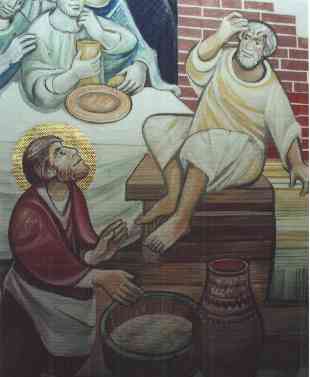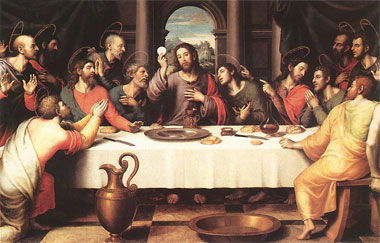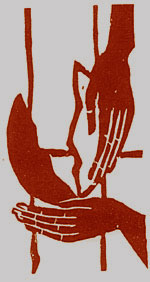|









|
|
- Eucharist: a practice
without domination.
" During a meal, […] Jesus raised from the table,
removed his coat and taking a cloth he tied it round his waist.
Then he poured water in a basin and began to wash the feet of
his disciples and to wipe them with the cloth from round his
waist" John 13, 2-5
In John's Gospel this part replaces the institution of the Eucharist
in the other Gospels where Jesus took the bread and a cup of
wine to announce that this food represents him giving himself.
These two accounts strengthen each other, one under the form
of a gift, the other as a service that is given.

|
To wash the feet of his friend, Jesus dressed like a slave.
Often the slaves, mostly women, were in charge of this work,
so useful considering the state of the roads, full of dust. So
that we understand that Peter indignantly refused. "You,
Lord, washing my feet! No, no, you will never wash my feet! |
-
- For him it was the utmost humiliation. But Jesus was not
forced to accomplish this service. He was not in the status of
a slave; he was free. He was the Master and the Lord.
He was not at all in a submissive attitude. In this action, Jesus
expressed his refusal of a superior status that he was "entitled
to" and more generally his refusal of any domination of
any body on any one else. "From now on I do not call
you disciples but friends"
In kneeling at his friends' feet, Jesus reversed the position
of man towards God. In fact, it is not man any more who raises
his eyes to God but God who raises His eyes to man. God put himself
at the service of men to very end, in kneeling before them, he
gave up to be the almighty God. But in doing so, are men going
to take advantage of Him? Is He not going to be overcome by them?
-
 |
It is there that we get back to the meaning of the bread and
the wine of Jesus' last meal. Jesus becomes as available as food
and drink to fulfill the human needs. He is at the disposal of
the hungry and the thirsty. He entirely offers himself without
any dominating attitude. And he asked us to do it in memory of
him. From this we feel how are inappropriate all the rules imposed
to the Eucharist and the limits assigned to have access to it.
Jesus did accept all the risks of our liberty. He did not give
a limit to his gift: "All of you eat and drink, it is
for the crowd" To exclude some body from Eucharist means
removing its character of being a free gift, its character of
a gift given without counting and without domination.
Every body is then invited to relate to others without a dominating
attitude. "If I, the Lord and the Master, washed your
feet, you too should wash the feet of one another" There
is not any more the need to wash other's feet, it does not figure
any more in the rules of welcoming our guests but we still have
to be at the disposal of the others and to listen and to help
every body. It is the only way to consider them as brothers and
sisters and to stop any desire to dominate them. Doing so they
will feel themselves existing as human being, in the full sense,
able to relate at the same level with the others. Eucharist without
an action of service is deprived of its meaning.

|
The attitude of having no-domination is not an attitude of
weakness but of strength. "Nobody is taking my life,
it is me who gives it". It is the power of a powerless
love. To adopt such an attitude, we have to be strong and to
know how to develop all our skills in humanity. |
-
- This does not surge from a will of power or pretending
but from diversified relationships and a faith in an original
unconditional love that preceded us. We have to open ourselves
to our own capacities as well as to others. In these conditions
we will be able to practice towards each other a no-dominating
attitude opening to a communion of fraternity that is a prelude
to the completeness of a promise life. Is it not the profound
meaning of the Eucharist?
|
